Did you know that sprout seeds are packed with nutrients and can provide up to 40 times more nutrition compared to their mature counterparts? That’s right, these tiny seeds are like nutritional powerhouses waiting to be unleashed. Whether you’re looking to add a boost of vitamins and minerals to your daily meals or wanting to experiment with fresh and flavorful ingredients, growing sprout seeds at home is the way to go.
Key Takeaways:
- Growing sprout seeds at home can provide up to 40 times more nutrition compared to mature plants.
- By sprouting seeds, you can enjoy fresh and flavorful ingredients right in your own home.
- Homegrown sprouts are a cost-effective and convenient way to add variety and nutrition to your diet.
- With proper care and the right tools, anyone can successfully grow sprout seeds at home.
- Stay tuned for my top tips on successful sprout seed cultivation!
Benefits of Sprouting Seeds
When it comes to nutrition and flavor, sprouting seeds offer a multitude of benefits. Whether you’re sprouting legumes or grains, the sprouting process enhances the nutritional value, making them a valuable addition to your diet.
Easier Digestion and Breaking Down Anti-Nutrients
One of the key advantages of sprouting seeds is that it improves their digestibility. The sprouting process breaks down hard-to-digest components such as phytic acid and enzyme inhibitors, making the sprouted seeds easier on the stomach. This makes sprouted legumes and grains a suitable option for individuals with digestive sensitivities.
Increased Vitamin C and B Content
When seeds sprout, their vitamin C and B content skyrocket. Sprouted seeds become a great source of these essential vitamins, providing added nutrition to your meals. Incorporating sprouts into your diet can help boost your immune system and support overall health.
Enhanced Fiber Content
Another advantage of sprouting seeds is the increase in fiber content. Sprouts are rich in dietary fiber, which promotes healthy digestion, aids in weight management, and helps regulate blood sugar levels. By including sprouted legumes and grains in your meals, you can easily increase your fiber intake.
A Cost-Effective and Delicious Addition to Your Diet
Not only are sprouted seeds packed with nutrition, but they are also a budget-friendly choice. Sprouting is a simple process that doesn’t require expensive equipment or ingredients. By sprouting your own legumes and grains at home, you can enjoy the benefits of fresh produce without breaking the bank.
Moreover, sprouts add a delicious crunch and vibrant flavor to salads, sandwiches, stir-fries, and more. They lend a delightful texture and taste that can elevate any dish. By incorporating sprouts into your meals, you can enhance both the nutritional value and the culinary experience.
Safety of Sprouting at Home
Many people worry about the safety of sprouting seeds at home due to the outbreaks of salmonella and E.coli associated with store-bought sprouts. However, the risk of food-borne illness is greatly diminished when sprouting at home. By controlling the seeds you use, ensuring cleanliness, and proper air circulation, you can safely enjoy homegrown sprouts. Cooking sprouts before consumption is also an option to eliminate any remaining bacteria.
Sprouting Seeds at Home: A Safe Alternative
With recent salmonella outbreaks linked to store-bought sprouts, it’s no wonder that safety concerns arise when considering sprouting seeds at home. However, when you take the necessary precautions, sprouting at home can be a safe and enjoyable experience.
One of the main advantages of sprouting at home is that you have control over the seeds you use. By purchasing high-quality sprouting seeds from reputable sources, you can reduce the risk of contamination. Look for seeds that are specifically labeled as suitable for sprouting to ensure they have been tested and verified to be free of bacteria like salmonella and E.coli.
Another critical factor in safe sprouting is maintaining a clean sprouting environment. Ensure that your sprouting equipment, such as jars and sprouting trays, is thoroughly cleaned before use. Wash your hands before handling the seeds and make sure all surfaces are sanitized. Regularly rinsing your sprouts during the sprouting process can help remove any bacteria that may be present.
Proper air circulation is essential for safe sprouting. Make sure your sprouts have access to fresh air by placing them in a well-ventilated area. Avoid covering the sprouts with tight-fitting lids or covers that may trap moisture and promote bacterial growth.
If you’re still concerned about potential bacteria, cooking your sprouts before consumption can provide extra peace of mind. Steaming or sautéing sprouts can eliminate any remaining bacteria and make them safe for consumption.
“Sprouting at home gives you full control over the safety of your sprouts. By following proper seed selection, cleanliness, and air circulation, you can enjoy delicious and safe homegrown sprouts.” – Anonymous
Benefits of Cooking Sprouts
Cooking sprouts not only ensures their safety but can also enhance their flavor and texture. Heat can transform the taste and make them more palatable for those who may not enjoy the unique crunch of raw sprouts. Additionally, cooking can increase the bioavailability of certain nutrients in sprouts, making them easier for our bodies to absorb and utilize.
| Benefits of Cooking Sprouts | Evidence |
|---|---|
| Improved safety | Heating sprouts kills any potential bacteria, reducing the risk of food-borne illnesses. |
| Enhanced flavor | Cooking sprouts can add depth and complexity to their taste, making them more enjoyable for some individuals. |
| Increased digestibility | Heat can break down certain complex compounds, making sprouts easier to digest. |
| Enhanced nutrient absorption | Cooking can increase the bioavailability of nutrients, allowing our bodies to better absorb and utilize them. |
Image: A visually appealing and relevant image depicting safe sprouting practices, emphasizing the importance of cleanliness, seed selection, and proper air circulation.
Sprout Seed Varieties
When it comes to sprout seed varieties, the options are endless. Almost any legume, seed, or nut can be sprouted, offering a wide range of flavors and textures to experiment with. Some popular sprout seed varieties include:
- Chickpeas
- Broccoli
- Millet
- Radish
- Red Clover
- Mung Beans
These sprout seeds are not only delicious but also packed with nutrients, making them a healthy addition to your diet. When sprouted, these seeds provide an abundance of vitamins, minerals, and antioxidants.
It is important to note that sprouting certain seeds, such as chia and flax seeds, can be a bit challenging. These seeds require specific conditions and techniques to sprout properly. If you’re a beginner, it’s best to start with the popular sprout seed varieties mentioned above before venturing into more tricky options.
Additionally, there are a few seeds that should be avoided or cooked thoroughly before consumption due to potential hazards. Kidney beans and quinoa contain toxins that can be harmful if not properly prepared. Therefore, it is recommended to either avoid sprouting these seeds or ensure they are cooked well before adding them to your sprout repertoire.
While nuts like almonds do not produce sprouts, they can be soaked to improve digestibility and release beneficial enzymes. Soaking nuts overnight before consuming them can make them easier to digest and enhance their nutritional profile.
Comparing Sprout Seed Varieties
| Seed | Flavor | Texture | Nutritional Benefits |
|---|---|---|---|
| Chickpeas | Mild and nutty | Tender with a slight crunch | High in protein, fiber, and iron |
| Broccoli | Fresh and slightly bitter | Crunchy and crisp | Rich in vitamin C, sulforaphane, and antioxidants |
| Millet | Mild and slightly sweet | Soft and chewy | Good source of protein, fiber, and magnesium |
| Radish | Peppery and spicy | Crunchy and firm | Rich in vitamin C, potassium, and antioxidants |
| Red Clover | Mild and earthy | Tender and delicate | Contains isoflavones, antioxidants, and minerals |
| Mung Beans | Grassy and nutty | Crunchy with a mildly chewy center | High in protein, fiber, and vitamins |
As you can see from the table above, each sprout seed variety offers its own unique flavor, texture, and nutritional benefits. Whether you’re looking for a mild and nutty taste or a peppery kick, there’s a sprout seed variety to suit your palate.
Importance of Sprouting-Specific Seeds
While regular seeds from the grocery store can be used for sprouting, it is recommended to use sprouting-specific seeds. These seeds are specifically meant for sprouting and offer several advantages compared to regular seeds.
Some seeds sold in grocery stores are irradiated to prevent sprouting, reducing their viability. This means that even if you try to sprout them, they may not yield satisfactory results. On the other hand, sprouting-specific seeds are carefully selected and processed, retaining their natural ability to sprout and grow.
One important aspect of sprouting-specific seeds is that they are tested and verified to be free of harmful bacteria like salmonella and E.coli. These bacteria can thrive in the sprouting environment, potentially causing foodborne illnesses. By choosing sprouting-specific seeds, you can have peace of mind knowing that the seeds you’re using have undergone rigorous testing to ensure safety.
To create a cleaner and safer sprouting environment, it is crucial to purchase sprouting seeds from reputable sources that specialize in sprouting seeds. These sources have strict quality control measures in place to offer you tested and verified seeds that are suitable for sprouting.
By using sprouting-specific seeds, you can ensure that you are growing sprouts that are not only flavorful and nutritious but also safe to consume. So, the next time you embark on your sprouting journey, consider investing in sprouting-specific seeds to enjoy cleaner and safer sprouts.
| Regular Seeds | Sprouting-Specific Seeds |
|---|---|
| Irradiated to prevent sprouting | Retain natural ability to sprout |
| No guarantee of safety from bacteria | Tested and verified to be bacteria-free |
| May have reduced viability for sprouting | Offer higher viability and success rates |
Quote:
“Choosing sprouting-specific seeds ensures that you’re using seeds specifically meant for sprouting, increasing your chances of success and ensuring a safer sprouting experience.” – Sprouting Guru
Where to Buy Sprouting Seeds
If you’re looking to buy sprouting seeds, you have a few options available to you. Whether you prefer the convenience of online shopping or the personal touch of browsing local stores, there are plenty of places where you can find organic sprout seeds to start your own sprouting journey.
Online Retailers:
Online retailers like Johnny’s Seeds and Sprout People offer a wide variety of sprouting seeds and mixes. These websites provide a convenient way to explore different seed options and choose the ones that best suit your preferences. Sprout People, in particular, has received positive reviews for their extensive selection, excellent germination rates, and high seed viability. When buying sprout seeds online, you can easily compare prices, read customer reviews, and make an informed decision.
Local Health Food Stores:
If you prefer the experience of shopping in person, you can also check out your local health food stores. While the selection may be more limited compared to online stores, you can still find sprouting seed packets that meet your needs. Local health food stores often curate a collection of organic products, including sprouting seeds, to cater to health-conscious individuals like yourself.
Whether you choose to buy sprout seeds online or from a local store, it’s important to look for organic options. Organic sprout seeds are grown without the use of synthetic pesticides or fertilizers, ensuring that you’re getting the highest quality seeds for your sprouting endeavors. By choosing organic sprout seeds, you can be confident in the purity and nutritional value of your homegrown sprouts.
With a wide range of options available to you, buying sprouting seeds has never been easier. Whether you’re a seasoned sprouter or just starting out, finding the right seeds to grow healthy and delicious sprouts is a breeze. Choose a reputable online retailer or visit your local health food store, and get ready to embark on your sprouting journey with high-quality, organic sprout seeds.
Tools for Sprouting Seeds
Getting started with sprouting seeds is a breeze when you have the right tools. All you need are a few simple items to set yourself up for success.
- A large clear jar
- A piece of natural, breathable fabric like cheesecloth or muslin
- A rubber band
For the jar, wide mouth quart Mason jars are a popular choice. They provide ample space for the sprouts to grow and are easy to work with. However, if you want to make larger batches of sprouts, you can opt for half-gallon jars.
When using the jar method, cover the top with the breathable fabric and secure it tightly with a rubber band. This allows air circulation while keeping the sprouts safe from contamination.
Optional Sprouter Lids for Easy Rinsing and Draining
If you want to simplify the rinsing and draining process, you can invest in sprouter lids designed for Mason jars. These convenient lids have built-in strainers that make it a breeze to rinse the sprouts without losing any of them in the process.
These sprouting tools are widely available and affordable, making them essential for any home sprouting setup. They will help you achieve successful sprouts and make the entire process enjoyable and hassle-free.
Sprouts for Pets
Sprouts aren’t just for humans – our furry friends can also benefit from these nutritious greens! In fact, many pets enjoy sprouts as a healthy and tasty treat. Let’s explore how sprouts can be incorporated into the diets of chickens, dogs, and cats.
Sprouts for Chickens
Chickens absolutely love sprouts, and they provide a fresh source of food for these feathered friends, especially during the winter months. When sprouting seeds for chickens, you can use bird mixes or foraging mixes to provide a variety of sprouts that will keep your chickens happy and healthy.
Here are a few popular sprouts for chickens:
- Wheatgrass
- Radish sprouts
- Clover sprouts
- Mung bean sprouts
Feeding sprouts to your chickens not only provides them with a nutritious diet but also helps to keep them entertained and stimulated.
Sprouts for Dogs and Cats
While dogs and cats may not eat seed sprouts directly, there is an excellent alternative that provides similar health benefits – wheatgrass.
Wheatgrass is a type of sprouted wheat that is packed with vitamins and minerals. It offers a range of benefits for both dogs and cats, including improved digestion, detoxification, and support for their immune system.
To incorporate wheatgrass into your pet’s diet, you can grow it indoors in small trays. Simply sprinkle wheatgrass seeds on a tray filled with potting soil, keep it moist, and within a week or so, your pet will have a fresh, nutritious treat.
Remember to introduce sprouts and wheatgrass gradually into your pet’s diet, as some animals may have sensitivities or allergies. Always consult with your veterinarian to ensure that sprouts or wheatgrass are suitable for your pet’s specific dietary needs.
Growing sprouts for your pets is not only a fun and rewarding experience but also a great way to provide them with a natural and nutritious treat.
Making Sprouted Grain Flour
Creating your own sprouted grain flour at home is a simple and rewarding process. By sprouting grains like wheat or rye and then drying and grinding them, you can enjoy the benefits of homemade flour that is richer in nutrients and flavor. Let me guide you through the grain sprouting process and the steps to make your own sprouted grain flour.
The Grain Sprouting Process
The sprouting process for grains is similar to seed sprouting. Start by soaking the grains in water overnight to trigger the germination process. Then, drain the water and rinse the grains thoroughly. Place the grains in a sprouting jar or a large bowl covered with a breathable fabric like cheesecloth or muslin. Remember to keep the grains moist by rinsing and draining them twice a day.
Harvesting Sprouted Grains
Allow the grains to sprout just until the first signs of a sprout appear. This usually takes around 2-3 days, but it may vary depending on the grain. Once the sprouts have reached the desired length, it’s time to harvest them. Rinse the sprouted grains one last time, making sure to remove any remaining husks.
Drying and Grinding the Sprouted Grains
To dry the sprouted grains, spread them out on a baking tray or use a food dehydrator. Set the temperature to the lowest setting (around 110°F/43°C) and dry the sprouts until they are fully dried and crispy. This can take anywhere from 8 to 24 hours, depending on the humidity and drying method.
Once the sprouted grains are fully dried, it’s time to transform them into flour. Use a grain mill to grind the dried sprouts into a fine powder. A grain mill ensures a consistent texture and preserves the nutrients in the flour. If you don’t have a grain mill, a high-speed blender or food processor can also be used, although the texture may not be as refined.
Benefits of Homemade Sprouted Grain Flour
Making your own sprouted grain flour offers several advantages. Firstly, the sprouting process breaks down anti-nutrients present in grains, making the nutrients more accessible and easier to digest. This results in a flour that is gentler on the digestive system and may be better tolerated by individuals with gluten sensitivities.
Additionally, homemade sprouted grain flour contains higher levels of vitamins, minerals, and enzymes compared to commercially processed flours. The natural fermentation that occurs during the sprouting process enhances the nutritional profile of the grains, increasing levels of B vitamins and improving overall digestibility.
Try Homemade Sprouted Grain Flour Today
Now that you have a step-by-step guide to making sprouted grain flour, why not give it a try? Experiment with different grains and ratios to discover your preferred flavor and texture. Homemade sprouted grain flour adds a wholesome and nutritious element to your baking, allowing you to create delicious treats with the added benefits of sprouted grains.
| Benefits of Homemade Sprouted Grain Flour |
|---|
| Improved digestibility |
| Enhanced nutrient availability |
| Higher levels of vitamins and minerals |
| Increased enzyme content |
| Natural fermentation for improved digestibility |
Start your journey to healthier baking by incorporating homemade sprouted grain flour into your recipes. Your taste buds and body will thank you!
Conclusion
Growing sprout seeds at home is a fun and rewarding experience. With the right seeds, tools, and knowledge, anyone can successfully grow their own sprouts. The benefits of sprouting seeds, such as improved digestibility and increased nutrition, make it a worthwhile endeavor.
By following the tips provided in this article, you can enjoy a year-round supply of fresh and delicious sprouts in your own home. Start by selecting the sprout seed varieties that suit your taste and dietary preferences. Remember to choose sprouting-specific seeds to ensure cleaner and safer sprouts.
Invest in basic sprouting tools like a large clear jar, breathable fabric, and a rubber band. These tools will make the sprouting process easier and more efficient. You can even expand your sprouting journey by making sprouted grain flour or growing sprouts for your pets.
So why wait? Begin your sprouting adventure today and reap the benefits of homegrown sprouts. Happy sprouting!


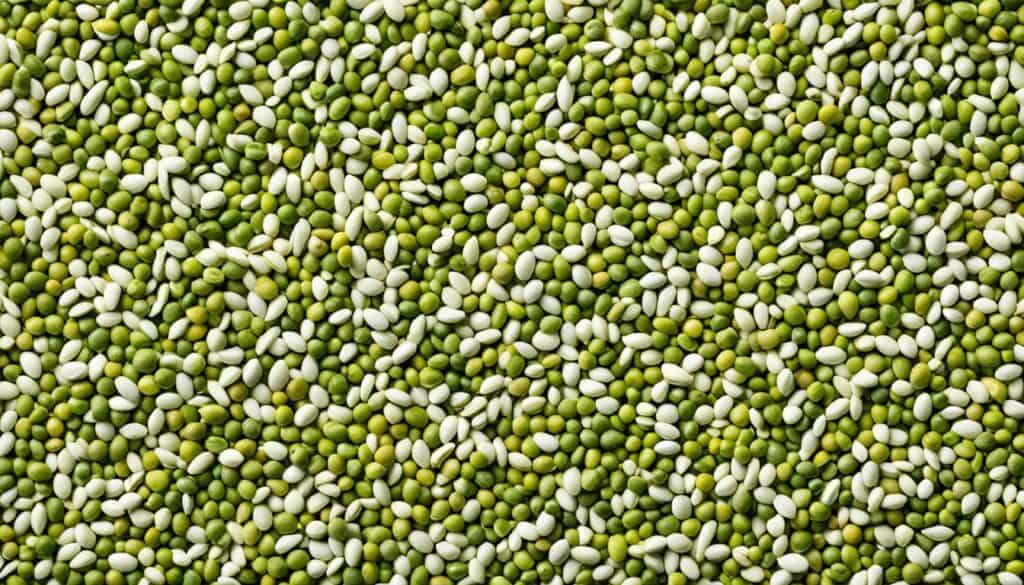
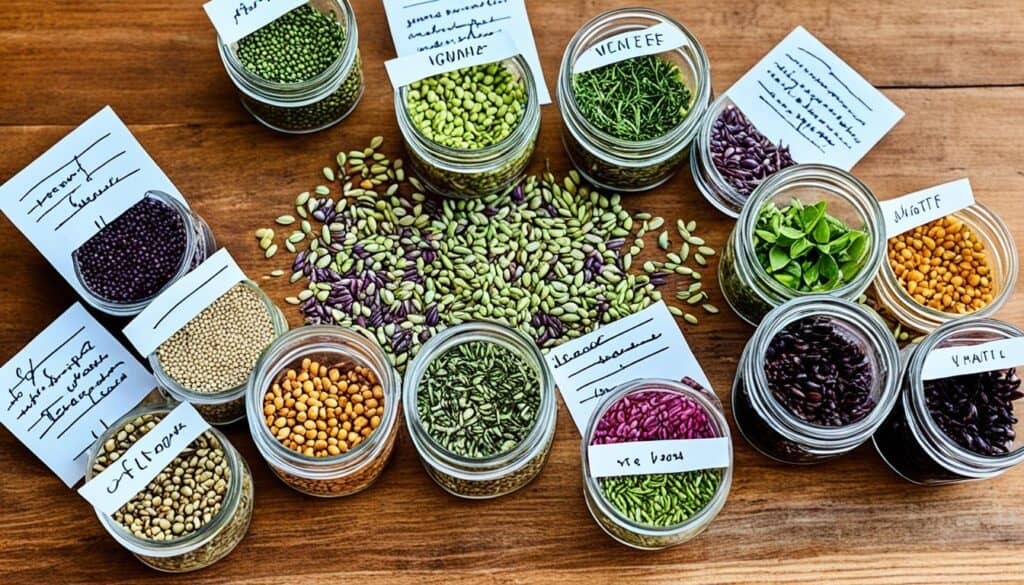
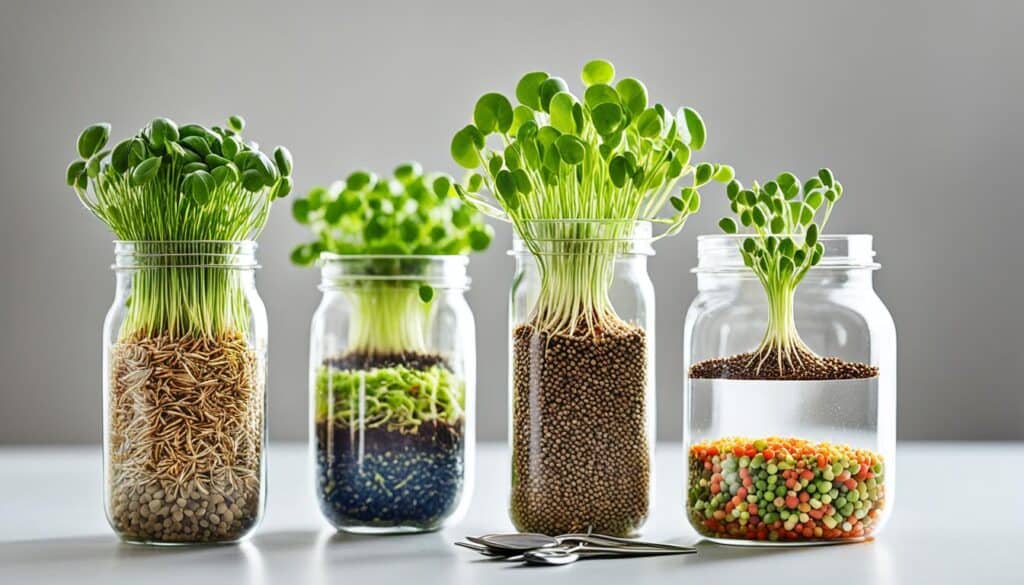
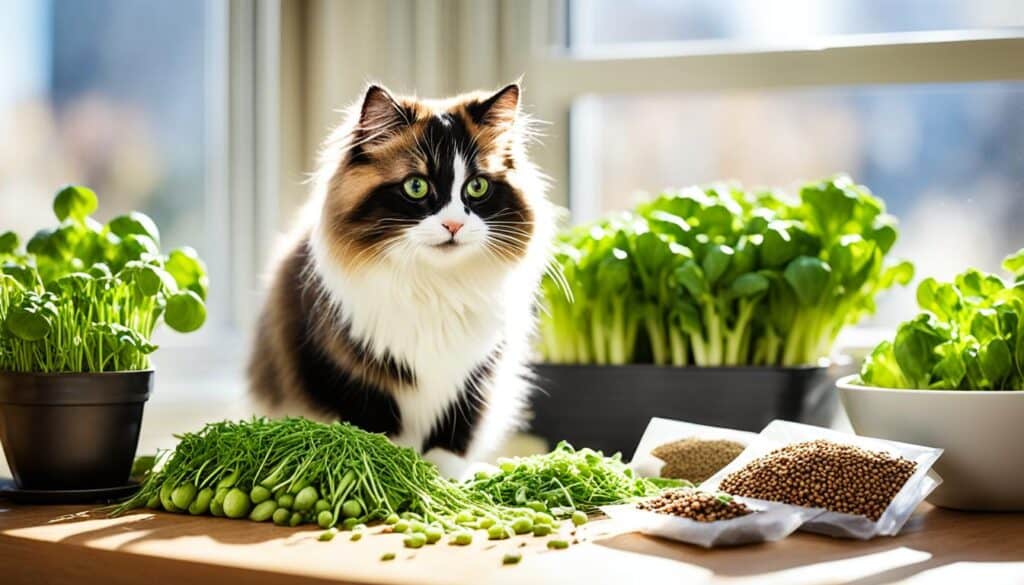
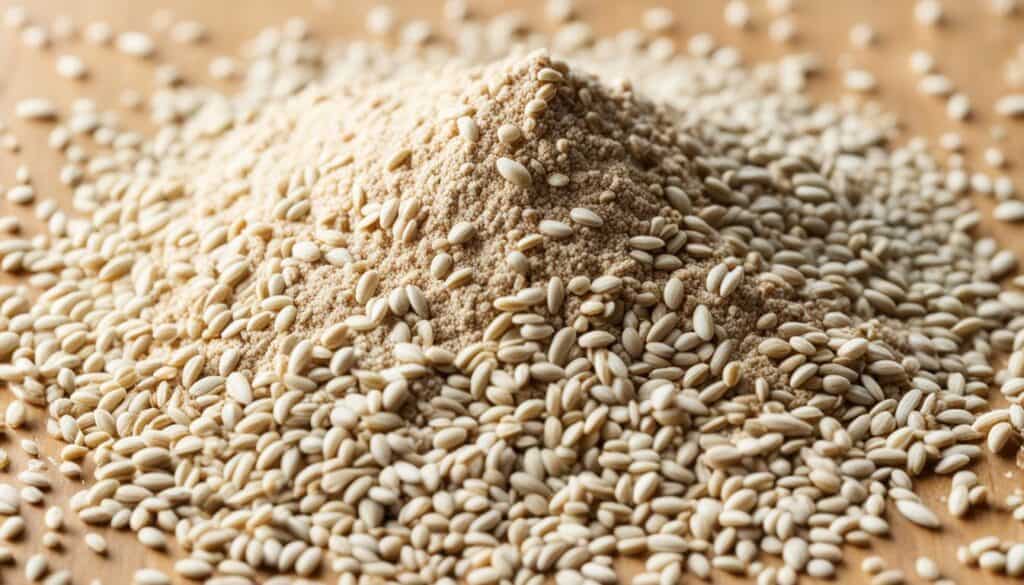



Leave a Reply